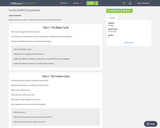
What are the cycles within ecosystems that help to keep them balanced?
- Subject:
- Ecology
- Material Type:
- Lesson Plan
- Author:
- Laura Samorske
- Heather Potts
- Date Added:
- 05/06/2018

What are the cycles within ecosystems that help to keep them balanced?
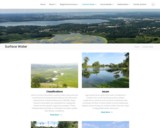
Dane County's abundant surface water resources are monitored and assessed primarily by the Wisconsin Department of Natural Resources (WDNR). Major streams and lakes are classified into categories based on the aquatic organisms present. These classifications provide an indication of water quality and fishery conditions.
Agricultural and urban land uses contribute to nutrient rich runoff reaching surface waters. Impervious surfaces and removal of wetlands also increases the flow of stormwater to local waterways. Explore issues facing our surface water and see maps of degraded water resources.
Effective water quality planning depends on long-term assessment and monitoring. The Capital Area Regional Planning Commission uses long-term datasets to evaluate regional trends.
Learn about practices meant to protect the region's streams, shorelands, and lakes.
Dane County
Land and Water Resources Viewer: An interactive county map showing watershed boundaries, thermally sensitive areas, cold water communities and more.
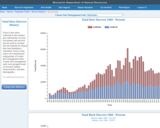
This Data set and graphs show the Deer harvest each year (1960-present) in Wisconsin for both the state and for each county.
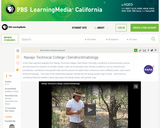
In this video segment adapted from Navajo Technical College, meet a dendroclimatologist who studies the relationship between precipitation and tree growth in the Navajo Nation.
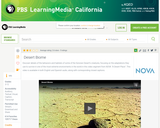
This video segment from NOVA: A Desert Place describes the physical characteristics and organisms that define the desert biome.
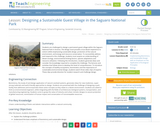
Students are challenged to design a permanent guest village within the Saguaro National Park in Arizona. The design must provide a true desert experience to visitors while emphasizing sustainable design, protection of the natural environment, and energy and resource conservation. To successfully address and respond to this challenge, students must acquire an understanding of desert ecology, environmental limiting factors, species adaptations and resource utilization. Following theintroduction, students generate ideas and consider the knowledge required to complete the challenge. The lectures and activities that follow serve to develop this level of comprehension. To introduce the concepts of healthy ecosystems, biomimetics and the importance of sustainable environmental design, students watch three video clips of experts. These clips provide direction for student research and challenge design solutions.

This lab activity allows students to indetify macroinvertebrates and determine the health of an acquatic ecosystem.
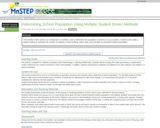
This activity is an introduction to population sampling techniques. Students' will identify weaknesses and strengths of a variety of techniques and determine the best applications of the various methods identified.
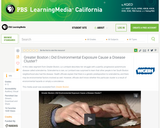
This video segment from Greater Boston examines whether environmental toxins may be to blame for a rare skin disease.
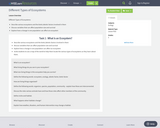
Different Types of Ecosystems:Describe various ecosystems and the biotic/abiotic factors involved in themDiscuss variables that can affect population size and survivalExplore how a change in one population can affect an ecosystem
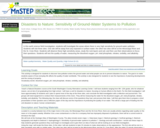
This activity is a field investigation where students will observe three areas with high sensitivity to pollution, and test water quality in two of the locations.
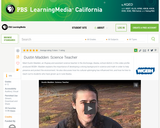
In this video profile produced for Teachers' Domain, meet teacher Dustin Madden, an IŰ__óíupiaq who hopes to inspire students to take an active role in protecting the natural environment by giving them a foundation in math and science.
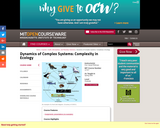
An introduction to theoretical studies of systems of many interacting components, the individual dynamics of which may be simple, but the collective dynamics of which are often nonlinear and analytically intractable. Topics vary from year to year. Format includes both pedagogical lectures and round-table reviews of current literature. Subjects of interest include: problems in natural science (e.g., geology, ecology, and biology) where quantitative theory is still in development; problems in physics, such as turbulence, that demonstrate powerful concepts such as scaling and universality; and modern computational methods for the simulation and study of such problems. Discussions in context of contemporary experimental or observational data.
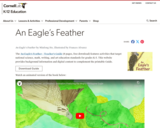
Students learn about habitats, wings, and conservation in this activity guide to accompany the children's book An Eagle’s Feather by Minfong Ho (an animated reading of the book is included on the webpage). Activities target national science, math, writing, and art education standards for grades K-5. This website provides background information and digital content to complement the printable Guide.
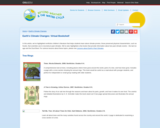
This list of carefully selected books for grades K-5 highlights nonfiction about climate proxies, those preserved physical characteristics, such as fossils, that scientists use to reconstruct past climates. Also highlighted are a few books that provide information about two past climatic events -- the last ice age and the Dust Bowl. In each issue of the free, online magazine Beyond Weather and the Water Cycle, the virtual bookshelf recommends books that accurately portray the theme drawn from the principles of climate sciences.
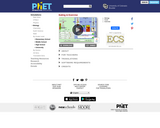
How many calories are in your favorite foods? How much exercise would you have to do to burn off these calories? What is the relationship between calories and weight? Explore these issues by choosing diet and exercise and keeping an eye on your weight.
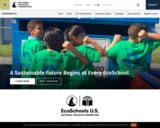
EcoSchools U.S. offers a certification program for elementary through secondary schools that nurtures environmental learning and climate action. Our award-winning, curriculum-linked framework supports school communities as they assess, track, benchmark, and celebrate environmental excellence. We are the exclusive national operator of the EcoSchools program in the United States, and a member of the international network of EcoSchools, coordinated by the Foundation for Environmental Education.
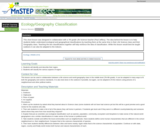
This short lesson was designed in collaboration with a 7th grade Life Science teacher (Paul Jeffery). The idea behind the lesson is to help students better understand ecological and geographical classifications by teaching them at the same time in their Life Science class and their Geography class. Teaching the two classifications together will help reinforce the idea of classification. While this lesson would best be taught outdoors it can also be adapted to the indoors.
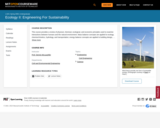
This course provides a review of physical, chemical, ecological, and economic principles used to examine interactions between humans and the natural environment. Mass balance concepts are applied to ecology, chemical kinetics, hydrology, and transportation; energy balance concepts are applied to building design, ecology, and climate change; and economic and life cycle concepts are applied to resource evaluation and engineering design. Numerical models are used to integrate concepts and to assess environmental impacts of human activities. Problem sets involve development of MATLABĺ¨ models for particular engineering applications. Some experience with computer programming is helpful but not essential.
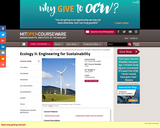
This course provides a review of physical, chemical, ecological, and economic principles used to examine interactions between humans and the natural environment. Mass balance concepts are applied to ecology, chemical kinetics, hydrology, and transportation; energy balance concepts are applied to building design, ecology, and climate change; and economic and life cycle concepts are applied to resource evaluation and engineering design. Numerical models are used to integrate concepts and to assess environmental impacts of human activities. Problem sets involve development of MATLABĺ¨ models for particular engineering applications. Some experience with computer programming is helpful but not essential.